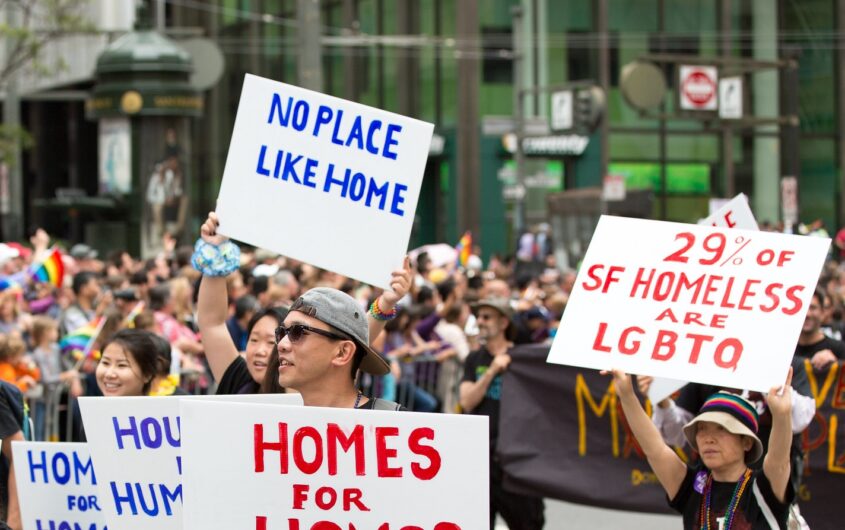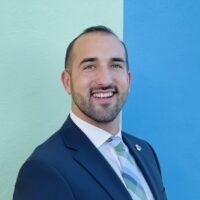
Thomas Hawk via Flickr
No Place Like Home

Akim van der Voort
Friedrich Naumann Foundation
Akim van der Voort is an expert on market economy, free trade, and globalization at the Friedrich Naumann Foundation in Berlin. He actively strives to integrate diversity and intersectionality into global political and economic debates. Prior to joining the foundation, he worked as an advisor for the German Development Agency GIZ in Nigeria and Botswana as well as at the Trade and Customs Department at the private consultancy firm Deloitte.
Akim has a master’s degree in international law from the University of Amsterdam and a bachelor’s degree in business law and economics from the Vienna University of Economics and Business. Before studying, he played a crucial part in founding a new liberal movement in Austria, campaigning for government reform and human rights. Subsequently, he served as an elected councilor in one of Vienna’s districts, where he fought for more representation and awareness for LGBTIQ+ communities at the local and city levels.

Tyler Renner
People Assisting the Homeless (PATH)
Tyler Renner works as Communications Director for PATH, a statewide homeless services provider and affordable housing developer in California. He has worked in a variety of public service roles focused on underrepresented communities. He received his Bachelor of Arts in Psychology from the University of California, Santa Barbara, and began his career as a behavioral therapist for youth on the Autism Spectrum. Tyler dedicated several years to LGBTQ+ and HIV/AIDS advocacy, working at the Pacific Pride Foundation in Santa Barbara and the San Diego LGBT Community Center as a Program Coordinator, Development Associate, and HIV Test Counselor. He served as Director of Community Outreach for San Diego City Council, District Three, focusing on constituent services, LGBTQ+ issues, and advancing policies that reduce homelessness. Tyler currently serves on the board of directors for San Diego Pride and writes for the San Diego Union-Tribune Community Voices Project.
Housing as an LGBTIQ Issue in Germany and the United States
Members of the lesbian, gay, bisexual, transgender, intersex, and queer (LGBTIQ) community exist in every culture and in every part of the world, and the fight for LGBTIQ equity and inclusion intersects with every social justice struggle. Housing is no exception; it is a multifaceted issue for LGBTIQ communities, intersecting with broader concerns about homelessness, housing discrimination, and the rising cost of living.
The modern LGBTIQ movement has centered housing and homelessness since the 1969 Stonewall Riots in New York City. Two prominent figures of the Stonewall uprising, activists Marsha P. Johnson and Sylvia Rivera, worked to ensure that the fight for LGBTIQ rights included the right to housing. They founded STAR, a street activist organization that provided housing and support to unhoused LGBTIQ youth and sex workers. Rivera and Johnson were the “mothers” of the household, and the organization was groundbreaking for the queer liberation movement. Their legacy of fighting for the most marginalized in our community by providing the most basic of needs—housing—lives on today.
Despite Germany’s reputation as one of the most progressive countries in terms of LGBTIQ rights, access to safe, stable, and affordable housing remains a significant challenge for many within these communities. The discrimination LGBTIQ people face in both public and private life often leads to housing precarity, compounding other forms of social exclusion.
Similar issues exist in the United States, with a key difference being that the United States maintains a patchwork of legal protections when it comes to LGBTIQ rights due to the federal structure of the legal and political systems. While some states have strong civil rights protections, a far-reaching anti-LGBTIQ political movement has been underway for the last several years. Hundreds of bills have passed to curtail LGBTIQ civil rights, many of which target the transgender community. While the focus of these laws has largely been on trans healthcare, students’ rights, and personal expression, there still is no federal law that protects LGBTIQ Americans from housing discrimination. This is especially troubling as findings from UCLA’s Williams Institute show that compared to non-LGBTIQ people, LGBTIQ Americans have “higher rates of poverty, lower rates of homeownership, and higher rates of homelessness.”
Homelessness
Homelessness in the United States is a far-reaching and complex issue. Data from 2023 shows that there are over 653,000 Americans experiencing homelessness, a staggering number that is larger than the population of Düsseldorf or Detroit. Within the homeless population, marginalized communities are overrepresented, including people of color, people with disabilities, and LGBTIQ people. When it comes to adults experiencing homelessness in the United States, the lack of affordable housing and low wages are often the drivers of housing instability, and for LGBTIQ people, seeking services, including shelter and affordable housing may be more challenging as discrimination and harassment tend to prolong their episodes of homelessness. Few homeless service providers have specific programs or services for unhoused LGBTIQ people, and shelters are often sex-segregated, leaving transgender and non-binary individuals particularly at risk of prolonged episodes of homelessness.
No one who comes out of the closet should end up on the streets.
For LGBTIQ youth, the main driver of homelessness is often family rejection. The Trevor Project has estimated that 28 percent of LGBTIQ youth have been affected by homelessness in the United States. Further, 40 percent of homeless youth in the United States identify as LGBTIQ. These sobering statistics show us that more needs to be done to ensure that youth who come out and experience family rejection can find an affirming place to call home. Thankfully, several organizations exist, mainly in large cities like New York and Los Angeles, to specifically support LGBTIQ youth. One of those providers is the Ali Forney Center in New York City. The nation’s largest agency serving LGBTIQ youth experiencing homelessness provides outreach, a drop-in center, case management, substance abuse prevention and treatment, counseling, and connections to transitional and long-term housing sites. Of the over 2,200 youth that come to the center, 80 percent have been kicked out of their homes due to their identity. While sites like this are greatly impactful, LGBTIQ youth exist in every corner of the country, and more needs to be done to protect this vulnerable population.
Currently, there is no data on the connection between the LGBTIQ community and homelessness in Germany, but the Berlin Senate (part of the city-state’s legislature) has commissioned a study on the topic to be finalized in December 2024. According to qualitative interviews in Munich, only 7.1 percent of social workers see LGBTIQ people as being at a higher risk of homelessness, while 34.6 percent estimate that they are at a lower than average risk for homelessness.
A 2021 study by the German Homeless Association (BAG Wohnungslosenhilfe) revealed that many shelters and housing services in Germany are ill-equipped to deal with the unique needs of LGBTIQ homeless people. Both countries can do more to provide services, shelter, and housing options for LGBTIQ people. No one who comes out of the closet should end up on the streets.
Discrimination
When it comes to legal protections for LGBTIQ individuals in seeking housing, Germany maintains more robust anti-discrimination laws. However, even with legal protections like the General Equal Treatment Act (AGG), housing discrimination against LGBTIQ individuals is pervasive. The AGG, enacted in 2006, prohibits discrimination on the grounds of sexual orientation, gender identity, race, religion, or disability. However, enforcing these protections is challenging, and many LGBTIQ individuals report encountering subtle forms of discrimination when trying to rent homes or apartments. A 2020 survey by DIW Berlin found that 13 percent of LGBTIQ individuals experienced discrimination in the housing market.
Landlords may reject same-sex couples or transgender individuals under the guise of more neutral justifications, such as a preference for other applicants, concerns about finances, or the compatibility of neighbors. These reasons often mask underlying biases, especially in conservative or rural areas of Germany, where traditional values can still lead to social exclusion for those seen as deviating from the norm.
In the United States, the Fair Housing Act prohibits discrimination based on race, color, religion, sex, disability, familial status, and national origin. Unlike Germany’s AGG, sexual orientation and gender identity are not explicitly listed in this federal law. Only twenty-two states and the District of Columbia prohibit discrimination in housing based on both sexual orientation and gender identity. The U.S. The Department of Housing and Urban Development (HUD) does state that the Fair Housing Act can be applied to LGBTIQ individuals in some cases, but without specific protections that can be universally applied, many people are still vulnerable to discrimination.
Much of the protections that have been provided for LGBTIQ Americans under the Fair Housing Act were based on interpretations and executive actions made by the Biden administration. It is extremely unlikely that the upcoming Trump administration will offer the same protections. This is particularly alarming for transgender Americans, as one in five have faced discrimination when looking for housing and one in ten have been evicted from their homes. Congressional Republicans, who will control both the House and Senate after January 2025, are strongly signaling a harsher policy towards the transgender community. For instance, in November 2024, House leadership announced a ban on transgender individuals using the bathroom that corresponds to their gender identity, likely in response to the election of the first transgender member Sarah McBride from Delaware.
As both nations navigate these pressing issues, it is clear that bold reassessments are needed regarding how LGBTIQ rights can be protected—no more empty promises or bureaucratic red tape. One key area of reform is the enforcement of anti-discrimination laws in housing. Laws, such as the AGG or the Fair Housing Act, need to be strengthened, and the government must ensure that housing discrimination cases are taken seriously and properly investigated. We must demand stronger enforcement of anti-discrimination laws and dedicated support services that genuinely address the unique needs of LGBTIQ individuals, particularly those at risk of being unhoused.
If Germany and the United States are to truly embody their democratic ideals, they must dismantle the barriers that deny safety and dignity to their most vulnerable citizens. Only then can we ensure that every LGBTIQ individual cannot just survive but thrive in a home that embraces their identity.
This article is part of the project “Building LGBTQ+ Communities in Germany and the United States: Past, Present, and Future” and is generously funded by the Transatlantik-Programm der Bundesrepublik Deutschland aus Mitteln des European Recovery Program (ERP) des Bundesministeriums für Wirtschaft und Klimaschutz(BMWK) (Transatlantic Program of the Federal Republic of Germany with Funds through the European Recovery Program (ERP) of the Federal Ministry for Economics and Climate Action (BMWK)).







